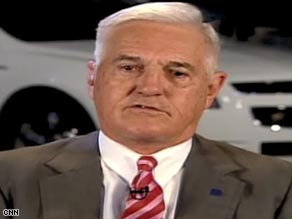President-elect Barack Obama called on Congress today to quickly approve short-term aid to the U.S. auto industry to prevent a "devastating" collapse, but a House-passed bill ran into strong Republican resistance in the Senate, and talks were underway this afternoon to salvage a compromise.
After hours of high-stakes talks, Senate Majority Leader Harry M. Reid (D-Nev.) said negotiations had taken a positive turn, setting up a potential breakthrough.
"We're a lot further down the road than I thought we would be," Reid said on the Senate floor late this afternoon.
As Reid spoke, a bipartisan group of senators and representatives from Detroit's Big Three automakers and the United Auto Workers union were meeting one floor below in the ceremonial Foreign Relations Committee Room, trying to broker an 11th-hour deal to save the rescue package.
One way or the other, Reid said, the negotiations would come to a final resolution tonight.
Faced with GOP opposition to a $14 billion White House-brokered rescue plan that passed the House last night, the negotiators were trying to work out a deal that could get through the Senate, where at least 60 votes would be needed to move it forward. Democrats currently control the chamber by a 50-49 margin, with one seat -- formerly held by Obama -- vacant.
Leading the negotiations were Sen. Christopher J. Dodd (D-Conn.), chairman of the Senate Banking Committee, and Sen. Bob Corker (R-Tenn.), a member of the panel.
Corker today put forward a plan that would impose far more stringent auto industry restructuring standards than the House bill. It would reduce the wages and benefits of union workers at domestic car manufacturers by requiring the total labor costs of GM and Chrysler to be "on par" with those in non-union U.S. plants of foreign automakers such as Toyota and Honda.
A bloc of GOP conservatives rallied behind the alternative plan advanced by Corker, who spent much of the day shuttling in and out of meetings with UAW officials, auto industry executives and key Democrats.
Corker said there is "a whole lot of Republican support" for his measure. But some Democrats think it "goes too far," said Sen. Carl M. Levin (D-Mich.), an ally of the UAW.
If the Corker proposal falls flat, Republican senators said, there likely would be no rescue plan at all.
"Absent that," Sen. Jon Kyl (R-Ariz.) said of the Corker plan, "nothing's going to pass."
'Business' 카테고리의 다른 글
| Sony (Finally) Lets Us Play In Home (0) | 2008.12.13 |
|---|---|
| The Bangalore Backlash: Call Centers Return to U.S. (0) | 2008.12.12 |
| Web 2.0 entrepreneur cashes out just in time (0) | 2008.12.12 |
| Diamond sells for recession-busting $24.3 M (0) | 2008.12.12 |
| Bank of America may shed 35,000 jobs (0) | 2008.12.12 |



